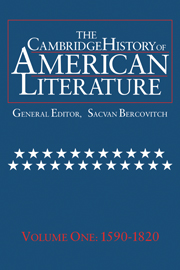Book contents
- Frontmatter
- Introduction
- THE LITERATURE OF COLONIZATION
- 1 The Papers of Empire
- 2 The Natural Inhabitants
- 3 Three Writers of Early America
- 4 Settlements
- 5 The Dispute of the New World
- 6 Traveling in America
- 7 The Final Voyage
- NEW ENGLAND PURITAN LITERATURE
- BRITISH-AMERICAN BELLES LETTRES
- THE AMERICAN ENLIGHTENMENT, 1750–1820
- THE LITERATURE OF THE REVOLUTIONARY AND EARLY NATIONAL PERIODS
- Chronology
- Bibliography
- Index
1 - The Papers of Empire
from THE LITERATURE OF COLONIZATION
Published online by Cambridge University Press: 28 March 2008
- Frontmatter
- Introduction
- THE LITERATURE OF COLONIZATION
- 1 The Papers of Empire
- 2 The Natural Inhabitants
- 3 Three Writers of Early America
- 4 Settlements
- 5 The Dispute of the New World
- 6 Traveling in America
- 7 The Final Voyage
- NEW ENGLAND PURITAN LITERATURE
- BRITISH-AMERICAN BELLES LETTRES
- THE AMERICAN ENLIGHTENMENT, 1750–1820
- THE LITERATURE OF THE REVOLUTIONARY AND EARLY NATIONAL PERIODS
- Chronology
- Bibliography
- Index
Summary
On the eve of leaving the known world to circle the globe in quest of an empire, Christopher Columbus decided to write a book. His decision foretold an important link between writing and colonizing, a link that entailed a redefinition of writing and of its relation to both the writer and history. That redefinition is the subject of this first, introductory chapter. In appropriating the New World, Europeans expropriated millions of prior inhabitants, and Chapter 2 interrogates the difficulties involved in recovering the historical substance of that expropriation today. The remaining five chapters seek to understand how the writing of books entered into the process of the conquest. Each chapter reads selected works very closely for what they reveal of the terms in which Europeans took possession of the New World, how they declared it new and yet timelessly theirs.
The emphasis throughout on the role of books and writing in the making of America does not imply a view that reality is the product of its telling. The literature of American colonization is a particular case characterized by its writers' conviction that writing could wield material power in shaping history. Only some thirty years separate the first printing of the Gutenberg Bible from Columbus's departure for the Canary Islands. In the late sixteenth century, the activities of writing and of publishing began to assume unprecedented social and political importance, and an assumption of new powers is evident in all the texts treated here. John Smith's tracts and histories intend to alter policies that the captain finds confoundingly resistant to more direct intervention.
- Type
- Chapter
- Information
- The Cambridge History of American Literature , pp. 11 - 36Publisher: Cambridge University PressPrint publication year: 1994

